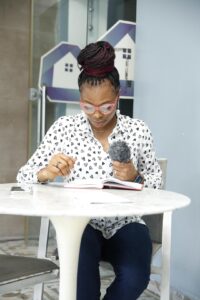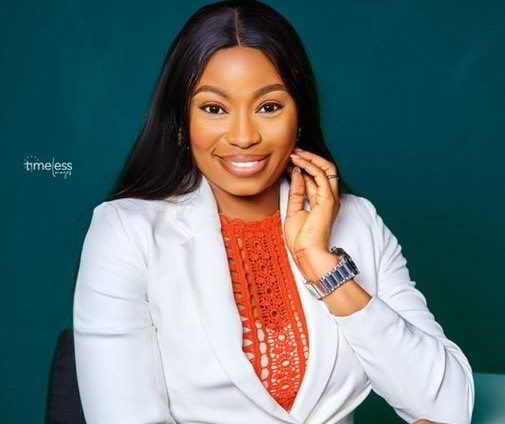Chioma Ezenwafor, News Manager at Nigeria Info FM, Wazobia FM and Cool FM radio stations in Port Harcourt, Rivers State has a remarkable media career development story that should interest journalists trying to master how to be multimedia skilled across specialisation in the industry and related fields.
She is not only accomplished journalist, author, Ezenwafor is a Media Trainer/Coach and Media/Communications Consultant, who writes articles for websites, content marketing for brands and Emceeing/MCing corporate events both online and offline.
In this interview with Media Career Development Network, the Alumna of 2022 Edward R. Murrow Program for Journalists of the International Visitor Leadership Program (IVLP) of the U.S Department of State and Fellow of the Female Reporters Leadership Programme of the Wole Soyinka Centre for Investigative Journalism (WSCIJ) shares her insightful career story and necessary steps to take to excel in journalism and media practice.
Between 2009 when you started as a broadcaster at UNIZIK FM and now, you can be aptly described as a multimedia-skilled professional across various industry specialisation areas. What did you do to accomplish your present “all media-rounder” status?
It was all fire when I started at UNIZIK FM back in 2009! A desire for storytelling that refused to be limited to just one medium was sparked by it. So I knew early in my career journey that success lies in my ability to adjust as fast as the media industry was changing and this motivated me to develop my multimedia skills as a journalist.
The radio industry was thrilling, but I was hungry for more. I embraced every opportunity. I volunteered for any project that pushed my boundaries. I learned to operate the cameras in church, edit raw footage, and even dabble in basic web design after I won a scholarship put together by a tech firm at the time. Every new skill broadened my perspective.
I actively networked with colleagues from print, online, and even photography at some point. We bounced ideas off each other when necessary, and learned from each other’s strengths.
I never shied away from freelance gigs, even when my plate was full. Every project, from creating social media content for a small business to editing a documentary for an NGO, honed my skills and exposed me to diverse storytelling styles.
Tech in Nigeria has grown, and so has the media and I’m happy I grew with them. I’m an active participant in online journalism communities, and I attend events whenever possible both within and outside the media industry. It’s been a constant learning curve that keeps my work fresh and relevant. It’siPhone safe to say that’s how I gained the “all media-rounder” status.

What challenges have you had to overcome considering the various limitations associated with the media and communication industry?
The challenges can be frustrating, but they’ve also made me a stronger, more resourceful journalist. They’ve pushed me to find creative solutions, think outside the box, and become more adaptable. They haven’t stopped me – they’ve fueled my passion for telling impactful stories.
Innovation with limited resources is a badge of honour in the media industry. Thank God that our mobile phones today now have almost all the tools needed to thrive in the industry. Once you invest in a good iphone these days, you are covered. But a decade ago, you would need a good midget to get quality audio and I didn’t have one. I used my laptop to record interviews and it was kind of stressful because I had to always take it with me wherever I went and turn to towards whoever I was interviewing to get a good quality. It was tacky.
Also, starting as a news editor meant early morning shifts. Some days were easy, but pregnancy days and early mornings weren’t. You could wake up early to produce the major news at 6 am and there will be no power supply. The generator could also decide to park up that day and refuse to start. Oh, I recall one back in 2015, when the generator refused to start, my dear Camry car also refused to start and seven-month-old heavily pregnant me at the time, had only 15 minutes to get to the office and have the bulletin ready in time. I won’t forget how I ran with my big tummy to our estate gate and into the dark streets of Port Harcourt, hoping to get a safe vehicle as quickly as possible to get me to work that early morning. Telling the story now may seem funny but that day was not at all. The lack of electricity and data were the frequent foes.
Fake news spreads like wildfire online. That’s a challenge because what we’ve now come to call fact-checking takes extra effort. Tracking down reliable sources, and sometimes even double-checking information just to verify a single claim. And this challenge isn’t going anywhere because that’s what has made today’s professional journalists even more relevant. I wish it wasn’t but it is.
Investigative journalism, especially, can be risky. I’ve had to tread carefully, cultivate trusted sources, and prioritise my safety and that of my family while still bringing important stories to light.
Being a woman in the media can be tough. From subtle comments to outright sexism, I’ve had to navigate situations where my credibility was questioned simply because of my gender. But it made me even more determined to carve my own space and prove my skills. I’ve had to work twice as hard to get past all that. Competence supersedes all that and I’ve had to focus on competence all through my career.
In one of your posts on LinkedIn, you disagreed with those who think Journalism is dying due to new technology. What should any journalists who want to remain relevant do?
Yes, tech is not killing journalism. It’s just transforming it. So journalists who want to thrive in this era, need to be storytellers across platforms – integrating text, video, social media, and even data visualisation. That’s why I agree with those who say there’s nothing like broadcast journalism or print journalism anymore. A journalist is a journalist and should have the ability to tell stories across all platforms.
It’s become essential as well to learn the new tools and platforms out there. Learn video editing, explore social media analytics, and stay curious about the latest innovations. Learn how to analyze data, identify trends, and present insights clearly and engagingly.
I would always say that it’s wise to go deep before you spread. At some point, you would need to niche down. You search out all your interests and pick where to become an expert in that specific field, offering valuable insights and analysis your audience craves. I’m currently exploring tech journalism and it’s got me hooked after I niched down to gender reporting for many years.
As I said earlier, fake news is a problem. So become a problem solver and double down on fact-checking, source verification, and transparency. Building trust with your audience. Credibility as the currency.
Talking “to” and not “at” your audience would help any journalist remain relevant.

Your second book is the works already shortly after the first, what is your motivation for writing them?
The truth is, I didn’t exactly jump right into a second book after first book, Becoming A News Titan, I’ve been working on the second book since 2022. It chronicles my career journey and contains some not-so-pleasant moments that I sometimes get into this war within me on whether or not I’m ready to share it with the world. But I’ve gone past all that now and have decided to only focus on sharing the lessons I’ve learned in my career journey while telling my stories.
I quickly realised this based on the feedback I got from those who read the first book. More and more readers asked me to tell them all about how I started and grew in the industry, which I barely touched on in the first book. The embers of the story remain, and I’m eager to fan them into a full flame.
So I decided to get past myself and focus on giving others a book I never had when I started. An actual manual to take with you as you navigate the media career journey and its many waters.
The creative spark is a powerful thing. Having the momentum and inspiration from the first book is making the writing of the second a smoother process.
So I’m actually capitalising on the reader interest generated by the first book.
There’s more to unpack.
I’m always pushing myself to grow. Writing this second book is testing my skills, and I’m more open to experimenting with new techniques.
You once recalled an impactful mentoring experience during an internship at NTA, how crucial is mentoring to excel as a media professional?
Oh, absolutely! The brief mentorship experience I got at NTA was a game-changer. I believe mentoring is crucial for media professionals because this career path can be overwhelming. A good mentor and career coach can give you a sound heads up and provide invaluable guidance for you, even help you identify skill gaps, and set realistic goals. No matter how short the duration of the mentorship, it can always make a difference. In my case, it was about three months but it went on to prepare me for the journey.
Mentors have years of experience and a deep understanding of the industry’s inner workings. So they can share insights on everything about this work. They can help you build confidence, which is key in media. A mentor can offer encouragement, celebrate your successes, and provide constructive criticism that helps you grow. Some of them can give you access to their network of contacts or even introduce you to potential employers, collaborators, or other media professionals who can help advance your career. I’ve enjoyed this.
The media world can be competitive. So a mentor provides that safe space to ask questions, make mistakes, and learn from them without judgment. I didn’t have this at some point and it showed in the way I handled issues. If I had a mentor in certain phases of my journey, I wouldn’t have gone through some things I had to go through, like bullying.
But my mentor in my early days, a seasoned journalist, Madam Augusta Maduegbunam, not only taught me valuable technical skills but also instilled in me the importance of ethics, accuracy, managing family and work. It helped get me far but I needed more guidance by the time I got in deeper into the career but it was kind of difficult to find one. I’m not sure why but I struggled to find a suitable mentor at some point. That’s where my career coach stepped on because I layed that demand on him and would ask him all manner of questions.
Being a mentor myself now, I see the power of this relationship firsthand. Guiding and supporting aspiring media professionals is incredibly rewarding, and it ensures a strong, diverse future for our industry.
READ ALSO: Don’t despise your journalism beginning
How should journalists manage each phase of their career without allowing one to hold them back?
Getting stuck happens to the best of us but it can be curbed. It’s a marathon, not a sprint. If a job isn’t offering growth or learning opportunities, don’t be afraid to move on. Early on, know that it’s about learning and building a foundation. So be open to internships, entry-level roles, and even freelance gigs, even if they aren’t your dream job. Because every experience hones your skills and builds your resume. Learn whatever skills are relevant to your chosen niche. Being a one-stop shop makes you a valuable asset in a competitive market. Explore different areas of journalism and identify what excites you.
Invest in professional development, be it workshops, online courses, or even certifications. Most journalists are used to free training but at some point, are open to paying to pick up certain skills. I recall my first business workshop, It was N150,000. I couldn’t afford it but I knew I needed that masterclass. So I met the organisers and offered my media services in exchange for a slot and they agreed. That business masterclass improved my negotiation skills, and I learned that I’ve been leaving a lot of money on the table. I also connected with top business owners, who later became my clients.
They say stagnant water stinks. So if you keep hoarding skills, soon they will become obsolete and you won’t know it. Volunteer to mentor younger journalists, lead projects, or take on editorial responsibilities. It shows that you take initiative and positions you for future leadership opportunities. Don’t dodge work.
Also, since I built my digital footprint, it has helped my career in many ways. I also got my website this year and it’s actually a game changer. So it’s wise to develop a strong portfolio website or actively engage on platforms like LinkedIn and Twitter. Showcase your work, connect with potential employers, and establish yourself as a thought leader.

As someone who creates learning resources, do you think journalists are maximising them and others as they should to accomplish their career aspirations?
I wish journalists could leverage them more effectively to fuel their career aspirations. There’s a wealth of free and paid resources available online and offline – courses, workshops, webinars, and certifications – but not all journalists actively seek them out. I understand that there is the time factor, the deadline race and crazy routines, but we need to be more intentional about them because they are important. Certain time management techniques can help us with this. I particularly use the Pomodoro technique.
How important is online visibility for media professionals considering how vain some of the popular metrics have become?
Very important, even though such metrics can be misleading. Like I said in one of my LinkedIn Posts, it shouldn’t be about likes, shares and follows. Online visibility for media professionals should be all about building relationships, establishing expertise, and sparking meaningful conversations.
We should think ‘thought leader,’ not ‘follower count.’
I have clients, colleagues and friends I’ve never met face to face. We met online, did projects together and stuck to each other ever since. There are so many such people who have impacted positively on my career.
How would you describe your career journey so far and your plans?
My career journey has been an exciting adventure in storytelling across media platforms. I’m always grateful to God that what started with a spark at UNIZIK FM in 2009 has gotten to this point.
A journalist, who thrives in dynamic environments. But the journey doesn’t stop here!
In the future, I plan to do more mentorship as much as time allows because I want others to have it easier than I did. Let’s hope they don’t abuse it.
The industry thrives on innovation, so I’m here for it.
I started a media company, a couple of years ago called Surthrive Media. So this is the vehicle I’m using to launch and partner on projects these days while I pursue my PhD and manage the newsroom of CoolWazobiainfo in Port Harcourt.
What is your advice for aspiring journalists and other colleagues?
Same thing I’ve said all through this interview. But I will put it in an acronym this time: E.F.E.B.
Embrace Lifelong Learning
Find Your Niche & Become an Expert
Experiment
Build Your Network


Wow,
Great Feat!
I love this interview, very motivating, and inspiring!
Chioma’s humbling experience, and resilience, is very encouraging and challenging..
I like the content, very rich, educative, expository and impactful!
Interviewer’s style of presentation, excellent,
simple narrative, comprehensive
And very insightful 👍
Many thanks to the MD, and the editor,
Mediacareerng.org, for
A great piece!
Good read!
It’s a formidable source of encouragement, to
Continue in Journalism,
Career, against all odds;
And I’m resolute to get
Get to the zenith, of this
Noble Profession and
Unique Vocation.
Thank you.
.